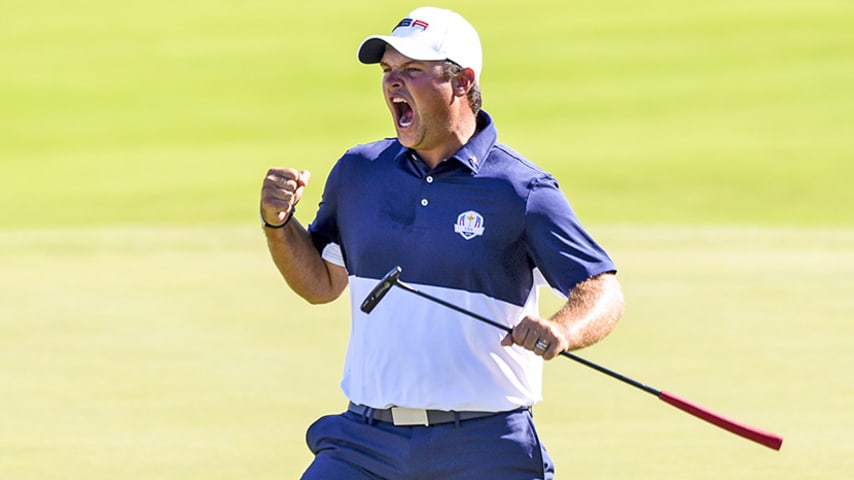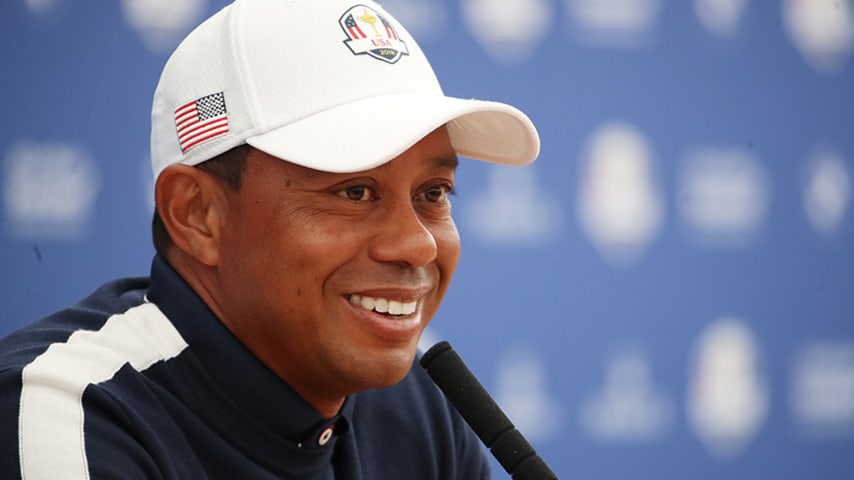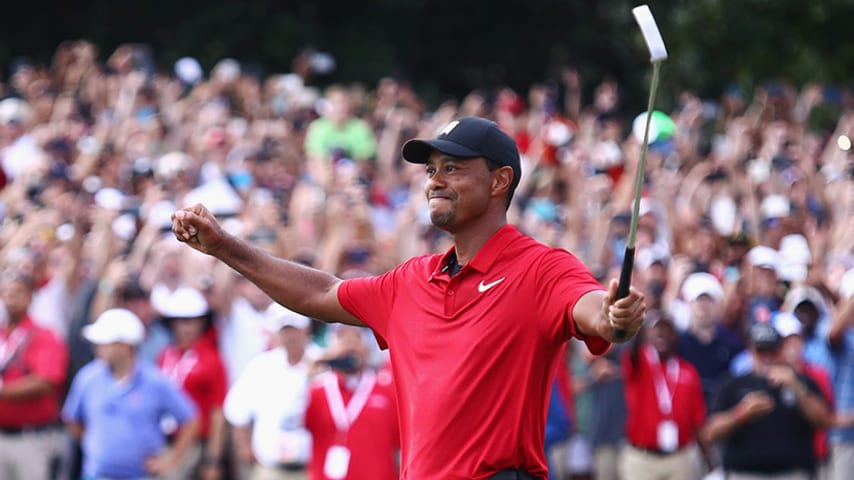Captain America Patrick Reed ready to end U.S. Ryder Cup drought in Europe
11 Min Read

CHASKA, MN - OCTOBER 02: Patrick Reed of Team USA celebrates his 1-up victory over Rory McIlroy of Team Europe on the 18th hole green during singles matches of the 2016 Ryder Cup at Hazeltine National Golf Club on October 2, 2016 in Chaska, Minnesota. (Photo by Keyur Khamar/PGA TOUR)
Patrick Reed, aka Captain America, is ready to end the U.S. drought in Europe
Written by Cameron Morfit
Patrick Reed, aka Captain America, is ready to end the U.S. drought in Europe

2018 Ryder Cup preview
It had been a week of painted faces and weird hairdos and rah-rah team spirit, but Patrick Reed had his game face on. He wanted an early knockout.
This was at the 2006 Canon Cup, which features the nation’s top 40 boys and girls from the American Junior Golf Association, East versus West, at Conway Farms outside Chicago. Reed was 15.
“He wasn’t a big name in junior golf yet,” says Walker Hill, who was with AJGA for 13 years and captained the East Team. “He had won the British Junior in ’06, but Patrick came on the scene in that match-play format as kind of an unknown to a lot of people. He was new. But right off the bat, he was a presence.”
Other players, such as the West’s Rickie Fowler and the East’s Peter Uihlein, were bigger names, but Reed’s results spoke for themselves. On day one, he and Lion Kim beat Cody Gribble and Drew Kittleson, 1 up. On day two, he and Ji Moon beat Josh Jones and Kyle Stanley, 5 and 4. By the last day of singles matches, Reed was campaigning to play against the West’s best player.
“We were pretty far behind,” says Hill, who now works for a homeless ministry in St. Louis. “I ended up putting Patrick in the anchor match because of his tenacity. All he wanted to do was play their best player, which was going to be either Rickie Fowler or Kyle Stanley.”
Stanley had won some big tournaments, as had Fowler. Uihlein, the reigning Rolex Junior Player of the Year, was among Reed’s teammates on the East squad, as were Isabel and Marika Lendl, daughters of the tennis legend Ivan.
By comparison, Reed had garnered little attention. Not yet. But he’d earned the right to play the best from the West.
“It ended up being Kyle Stanley,” Hill continues. “Patrick had beaten him in the team setup, and he kept saying, ‘This kid is not going to see hole 15.’ He either wrote 15 on his golf ball, or on his golf glove, as his motivation. And, of course, he closed him out on 14, beat him 5 and 4 and Kyle didn’t see hole 15.
“Even back then, Patrick was a confident young man,” Hill adds. “He was never cocky; he was a genuine guy that just flat-out competes.”
The Ryder Cup starts later this week at Le Golf National outside Paris, where Reed and the U.S. Team will try to win on foreign soil for the first time since 1993. Reed is 6-1-2 in two Ryder appearances, and he’s similarly potent in the Presidents Cup (4-3-2 in two appearances, including a 4-0-1 mark with partner Jordan Spieth).
While the above scene 12 years ago did not take place in either of those events, others like it are burned into our memory.
The bonkers singles victory over Rory McIlroy at Hazeltine in 2016. The grind-it-out takedown of Henrik Stenson at Gleneagles in 2014, when Reed shushed the European crowd. Other Reed exploits, like the college grudge matches against Harris English (Georgia) and Uihlein (Oklahoma State) that were part of his 6-0 record as Augusta State won national titles in 2010 and ’11, we’ve heard about enough to feel like we were there.
Collectively, Reed’s body of work begs the question: How did he get so good at this?
Absolute absorption
Life is messy, and you can’t always know where you stand, but not so in match play. It’s right in front of you -- the hole-by-hole stakes (win/lose/tie), the threat (your opponent is never out of sight), and how everyone feels (your teammates are with you, America loves you, and everyone else not so much).
All of which helps explain why Reed goes into this Ryder Cup as America’s toughest out. In college, he was so excitable for match play, his nickname was Next Level. But excitement and enthusiasm only go so far; Reed, more than most players this side of Ian Poulter (more on him shortly), somehow utilizes that run-through-a-wall spirit to elevate his play.
“I just get more jacked up, more excited,” Reed says of his Captain America persona. “Just really pumped and goin’, and that’s why even if it’s a 5-footer for par, I’m screaming. I think just the show of emotion gets the crowd going, gets me kind of going, kind of picks you up. That’s a week that’s all on adrenaline.
“When your back is up against the wall,” he adds, “or the team is relying on you, I just learned somehow how to harness that and actually use that in a positive way. I learned how to not get too excited and hit it too far, getting out of my rhythm. My swing almost gets tighter and gets better in those situations.”
For a while, Reed’s most famous match was against Oklahoma State’s Uihlein in the semifinals of the 2011 NCAA National Championship. They were playing at Karsten Creek, Oklahoma State’s home course, and Uihlein, son of Acushnet CEO Wally Uihlein, was the reigning U.S. Amateur champion and a can’t-miss pro prospect.
Reed birdied six of the first 11 holes and won 8 and 7.
The next day, in the final, Reed was set to play Harris English of Georgia in the anchor match. Fearing that his man might be too hyped up, since he’d transferred from Georgia, then-Augusta coach Josh Gregory approached Reed to dispense some sort of coaching advice.
“I walked up to him and he said, ‘Don’t even say a word. I’ve got this,’” Gregory recalls.
Reed did. He beat English, giving Augusta its second national title.
“I’ve told a lot of people this: I think Patrick could potentially go down as one of the best Ryder Cup players of all time,” Gregory says. “He’s so tough to beat one-on-one; he’s not afraid of anything. The Spieth-Reed pairing has been so successful, and they feed off each other, and when things are going well they’re two of the best players in the world.
“Patrick’s kind of like a linebacker playing golf,” adds Gregory, who has since left the school and counts Reed as one of his many students on the PGA TOUR and Web.com Tour. “He’s got that I-want-to-hit-you mentality. I want to knock you down.”
Perhaps no match in recent memory evoked a college football rivalry game, or maybe a boxing match or MMA tilt, more than Reed going toe-to-toe with Rory McIlroy at Hazeltine two years ago. Their flurry of front-nine birdies and an eagle produced an uncharacteristic moment of bravado from McIlroy (“I can’t hear you!” he yelled to the crowd, cupping his hand to his ear), a finger wag (Reed, after answering McIlroy’s crazy birdie with one of his own), and deafening eruptions from the large American crowd as Reed produced a wildly entertaining 1-up victory.
Although the quality of play dipped slightly on the back nine, it was an unforgettable, rollicking good time that set the tone for a U.S. victory. Following on the ground, Poulter, who was 12-4-2 in five Ryder Cup starts before an injury left him in the role of vice-captain in 2016, was duly impressed—maybe the highest praise any U.S. player could ever receive, considering the source.
“He gets it,” Poulter, who earned a captain’s pick to rejoin this year’s European side, says of Reed. “He gets the Ryder Cup. There’s a lot of passion and excitement and he definitely gets it. He enjoys that atmosphere, he embraces it. That was a fun match to be a part of.”
Heartbeat of America
Jeff Overton was an American catalyst at Celtic Manor in 2010, a narrow victory for Europe, and Keegan Bradley was that guy at Medinah in 2012, but almost as quickly as they came on the scene they stopped making Ryder and Presidents Cup teams.
The U.S. has at times struggled to find a consistent heartbeat. Meanwhile, Europe had Poulter, Colin Montgomerie and Sergio Garcia, competitors for whom the Ryder Cup has had a transformational effect, making very good players reliably great over long-time horizons.
But in Reed, it seems, the U.S. teams have their heartbeat. What’s more, he doesn’t appear to be going anywhere, having taken his career to the next level with his Masters victory in April. There was even a hint of his Ryder and Presidents Cup prowess in that career-defining win, as many Masters patrons were cheering not for Reed but for his playing partner, McIlroy, to complete the career Grand Slam. What’s more, McIlroy had engaged in some Ryder Cup-style gamesmanship, telling the press after the third round that all the pressure was going to be on Reed.
“That was music to Patrick’s ears,” Gregory says. “Don’t poke the bear.”
In truth, Reed has been the heartbeat of every team he’s played on since that ’06 Canon Cup, where Fowler had his hair done up in something resembling a Statue of Liberty crown, and players who sat out a session caddied for teammates who were competing.
“I knew Slick Rick back then,” Reed says of Fowler. “When I saw (the hairdo), it made me laugh pretty hard. I thought it was cool that when we weren’t playing, our other teammates were playing and we were caddying, wearing bare feet, trying to coach them on what to do. It was a blast.”
He smiles at the memory.
“We all stayed in the same hotel,” Reed continues, “on the same floor, and we’re all pulling pranks on the other guys and stuff like that. It was stuff that kids can do but you wouldn’t get away with now; if I tried to pull pranks on Rosy or Stenson, you might get hit. You might get thrown out of the room. Who knows what would go on?”
If Reed’s opponents don’t always know what to make of him, it should be noted that some of his teammates don’t, either. Ask the best American players about Reed and, almost to a man, they shrug and say they don’t know him that well. However, they add, they’re “glad he’s on our side.”
Indeed, Reed keeps mostly to himself, sometimes with headphones on. More than many players his age, Reed appreciates that social media is just noise and professional golf isn’t a popularity contest. The game is the thing -- and winning supersedes all.
“Patrick can go in, whether he’s in form or out of form, and he can play some of the best golf he’s ever played,” says Spieth, with whom Reed has gone 8-1-3 in team play, including 4-1-2 in the Ryder Cup. “It’s an odd thing to do.
“So much of it has to do with the physical aspects, right?” Spieth adds, as if he’s still trying to figure it out himself. “The fine-tuning. For him it almost doesn’t matter, he can, like, will the ball where he wants it to go, and he’s so confident and aggressive in the way he putts, especially inside of 12 feet, at the Ryder Cup. I don’t know how he does it.”
Especially memorable, Spieth added, was a Four-ball match at the 2016 Ryder Cup in which Reed went on a birdie barrage and he and Spieth beat Henrik Stenson and Justin Rose, 2 and 1.
“I had played poorly,” Spieth says, “and whoever was Henrik’s partner had played poorly that day, and it was kind of a one-on-one show within the best-ball match.”
Reed birdied 5, eagled 6, birdied 7, and birdied 8. Stenson tried to answer, but when Reed birdied 14 and 15 to give the Americans a 3-up lead with three to go, it was basically over.
If Spieth and others sometimes marvel at Reed, Reed has at times been captivated by the heroics of his Euro equivalent, Poulter. As the rappers put it: Game recognize game. This played out most vividly when the fiery Englishman Poulter made five straight birdies to close out a four-ball match victory with partner Rory McIlroy at the 2012 Ryder Cup at Medinah.
Reed watched it all on TV as Poulter’s thrusting fists, bugging eyes, and piercing screams woke up Europe, setting the tone for the continent’s wildly improbable comeback the next day.
“I’m just sitting there,” Reed says, “like: Yeah, I want a piece of him.”
Asked what would happen if the two met in singles, Reed makes no brash predictions other than to note that he has already defeated Stenson and McIlroy, two of Europe’s toughest competitors.
A bemused smile comes over Poulter’s face when presented with the same hypothetical.
“We’ll see,” Poulter says. “We’ll see.”
Beating Poulter, though, would not be the ne plus ultra of team golf for Captain America. The ultimate, for Reed, would be leading what he has calls the underdog U.S. Team to its first Ryder Cup win on foreign soil in 25 years in front of what is sure to be a hostile crowd.
It’s bound to be hard, and rowdy, but you get the sense that Patrick Reed prefers it that way.












